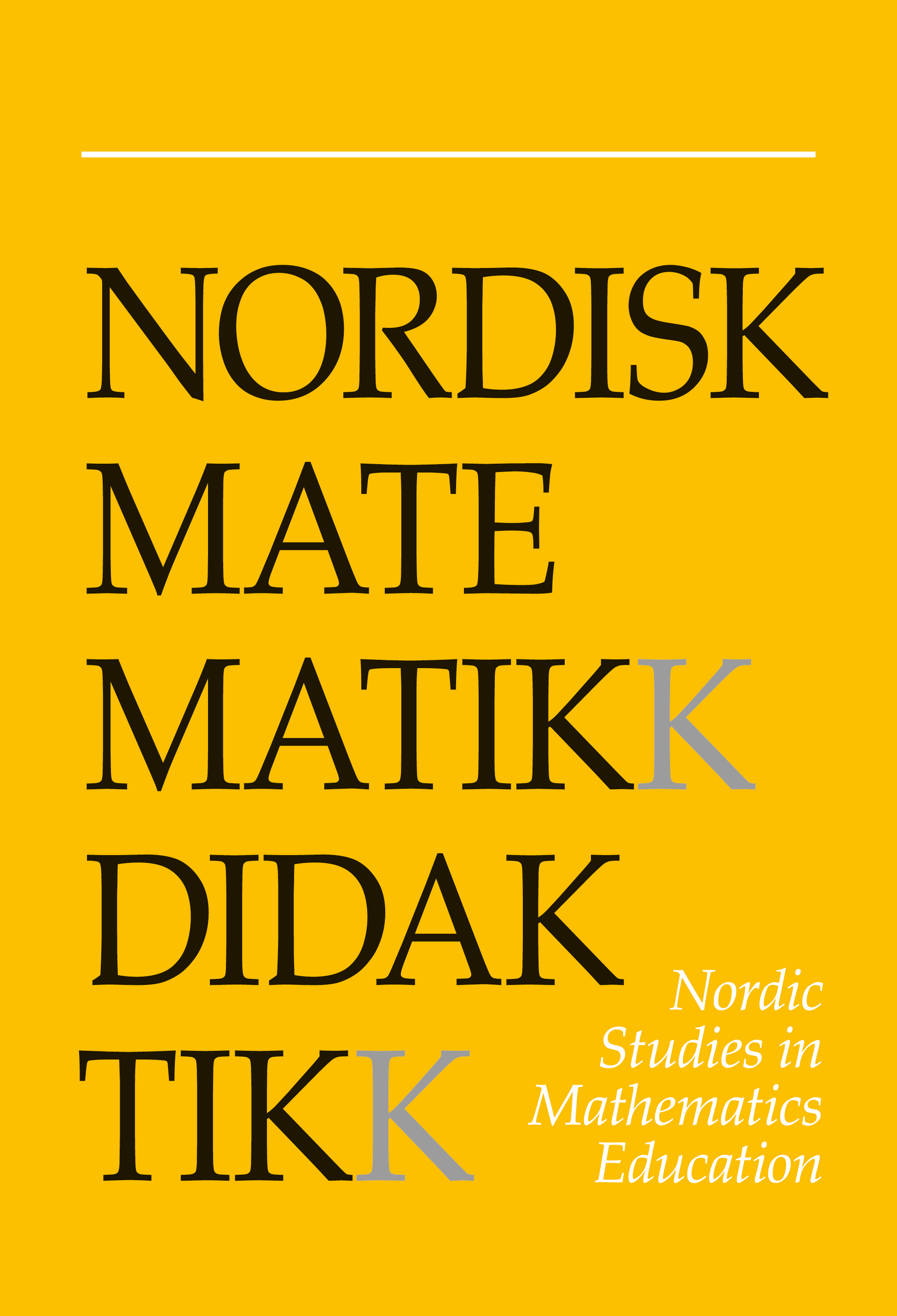Oral presentations as a tool for promoting metacognitive regulation in real analysis
DOI:
https://doi.org/10.7146/nomad.v22i4.148922Abstract
Real Analysis is for many students their first proof-based mathematics course, and many find it challenging. This paper studies how oral presentations of mathematical problems for peers can contribute to students’ metacognitive reflections. The paper discusses several aspects tied to preparing for, and carrying out, oral presentations, that seem to spur important sub-components of metacognitive regulation such as planning, monitoring, and evaluating. Thoughtful guidance from an expert encouraged the students to further monitor their cognition, and evaluate their arguments and cognitive processes when expressing their reasoning to their peers.
References
Alcock, L. & Simpson, A. (2002). The Warwick analysis project: practice and theory. In D. Holton (Ed.), The teaching and learning of mathematics at university level. An ICMI study (pp. 99-111). Dordrecht: Springer. https://doi.org/10.1007/0-306-47231-7_10
Alcock, L. & Weber, K. (2005). Proof validation in real analysis: inferring and evaluating warrants. Journal of Mathematical Behavior, 24 (2), 125-134. https://doi.org/10.1016/j.jmathb.2005.03.003
Alcock, L. & Wilkinson, N. (2011). E-proofs: design of a resource to support proof comprehension in mathematics. Educational Designer, 1 (4).
Cowen, C. (1991). Teaching and testing mathematics reading. American Mathematical Monthly, 98 (1), 50-53. https://doi.org/10.1080/00029890.1991.11995704
Cross, D. R. & Paris, S. G. (1988). Developmental and instructional analyses of children's metacognition and reading comprehension. Journal of Educational Psychology, 80 (2), 131-142. https://doi.org/10.1037/0022-0663.80.2.131
Davis, E. A. (2003). Prompting middle school science students for productive reflection: generic and directed prompts. The Journal of the Learning Sciences, 12 (1), 91-142. https://doi.org/10.1207/S15327809JLS1201_4
Flavell, J. H. (1979). Metacognition and cognitive monitoring: a new area of cognitive-developmental inquiry. American Psychologist, 34 (10), 906-911. https://doi.org/10.1037/0003-066X.34.10.906
Fuller, E., Weber, K., Mejia-Ramos, J. P., Rhoads, K. & Samkoff, A. (2014). Comprehending structured proofs. International Journal for Studies in Mathematics Education, 7 (1), 1-32.
Garofalo, J. & Lester, F. K. (1985). Metacognition, cognitive monitoring, and mathematical performance. Journal of Research in Mathematics Education, 16, 163-176. https://doi.org/10.2307/748391
Hodds, M., Alcock, L. & Inglis, M. (2014). Self-explanation training improves proof comprehension. Journal for Research in Mathematics Education, 45 (1), 62-101. https://doi.org/10.5951/jresematheduc.45.1.0062
Hogan, K. (1999). Thinking aloud together: a test of an intervention to forster students' collaborative scientific reasoning. Journal of Research in Science Teaching, 36 (10), 1085-1109. https://doi.org/10.1002/(SICI)1098-2736(199912)36:10<1085::AID-TEA3>3.0.CO;2-D
Kuhn, D. & Dean, D. (2004). A bridge between cognitive psychology and educational practice. Theory in Practice, 43 (4), 268-273. https://doi.org/10.1207/s15430421tip4304_4
Lai, E. R. (2011). Metacognition: a literature review. Pearson research report. Retrieved from http://www.pearsonassessments.com/hai/images/tmrs/ Metacognition_Literature_Review_Final.pdf.
Lithner, J. (2008). A research framework for creative and imitative reasoning. Educational Studies in Mathematics, 67 (3), 255-276. https://doi.org/10.1007/s10649-007-9104-2
Maher, C. A. (2005). How students structure their investigations and learn mathematics: insights from a long-term study. Journal of Mathematical Behavior, 24, 1-14. https://doi.org/10.1016/j.jmathb.2004.12.006
Martinez, M. E. (2006). What is metacognition? Phi Delta Kappan, 696-699. https://doi.org/10.1177/003172170608700916
Mason, J. H. (2002). Mathematics teaching practice: a guide for university and college lecturers. Chichester: Horwood Publishing. https://doi.org/10.1533/9780857099648
Mueller, M. & Maher, C. A. (2009). Learning to reason in an informal math after-school program. Mathematics Education Research Journal, 21 (3), 7-35. https://doi.org/10.1007/BF03217551
Mueller, M., Yankelewitz, D. & Maher, C. A. (2014). Teachers promoting student mathematical reasoning. Investigations in Mathematics Learning, 7 (2), 1-20. https://doi.org/10.1080/24727466.2014.11790339
Polya, G. (1945). How to solve it? Garden City: Doubleday. https://doi.org/10.1515/9781400828678
Reisel, R. B. (1982). How to construct and analyze proofs - a seminar course. The American Mathematical Monthly, 89 (7), 490-492. https://doi.org/10.1080/00029890.1982.11995483
Sahin, A. & Kulm, G. (2008). Sixth grade mathematics teachers' intensions and use of probing, guiding, and factual questions. Journal of Mathematics Teacher Education, 11 (3), 221-241. https://doi.org/10.1007/s10857-008-9071-2
Schneider, W. & Artelt, C. (2010). Metacognition and mathematics education. ZDM, 42, 149-161. https://doi.org/10.1007/s11858-010-0240-2
Schoenfeld, A. H. (1985). Mathematical problem solving. Orlando: Academic Press.
Schoenfeld, A. H. (1987). What's all the fuss about metacognition? In A. H. Schoenfeld (Ed.), Cognitive science and mathematics education (pp. 189-215). Hillsdale: Erlbaum.
Schraw, G. (1998). Promoting general metacognitive awareness. Instructional Science, 26, 113-125. https://doi.org/10.1023/A:1003044231033
Schraw, G., Crippen, K. J. & Hartley, K. (2006). Promoting self-regulation in science education: metacognition as part of a broader perspective on learning. Research in Science Education, 36, 111-139. https://doi.org/10.1007/s11165-005-3917-8
Selden, A. & Selden, J. (2003). Validations of proofs considered as texts: Can undergraduates tell whether an argument proves a theorem? Journal for Research in Mathematics Education, 34 (1), 4-36. https://doi.org/10.2307/30034698
Weber, K. (2004). Traditional instruction in advanced mathematics classrooms: a case study of one professor's lectures and proofs in an introductory real analysis course. Journal of Mathematical Behavior, 23, 115-133. https://doi.org/10.1016/j.jmathb.2004.03.001
Weber, K. (2012). Mathematicians' perspectives on their pedagogical practice with respect to proof. International Journal of Mathematical Education in Science and technology, 43 (4), 463-482. https://doi.org/10.1080/0020739X.2011.622803
Weber, K. & Mejia-Ramos, J. P. (2014). Mathematics majors' beliefs about proof reading. International Journal of Mathematical Education in Science and technology, 45 (1), 89-103. https://doi.org/10.1080/0020739X.2013.790514
Zan, R. (2000). A metacognitive intervention in mathematics at university level. International Journal of Mathematical Education in Science and technology, 31, 143-150. https://doi.org/10.1080/002073900287462
Downloads
Published
How to Cite
Issue
Section
License

This work is licensed under a Creative Commons Attribution-NonCommercial-ShareAlike 4.0 International License.



